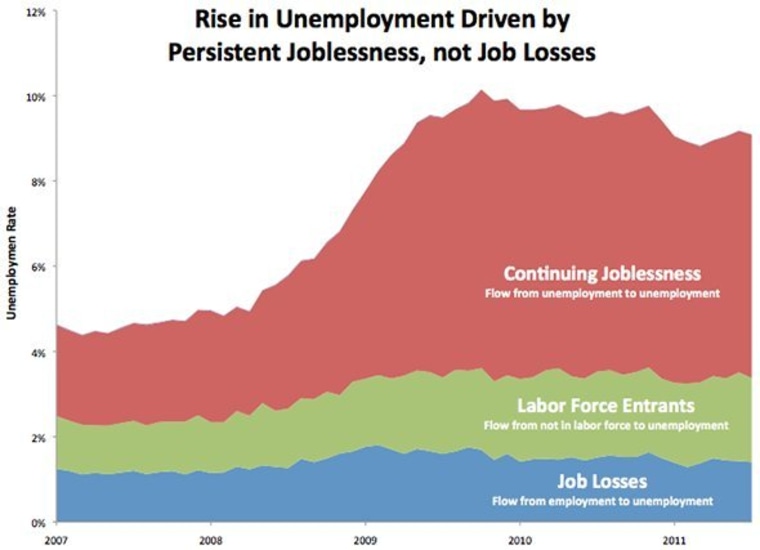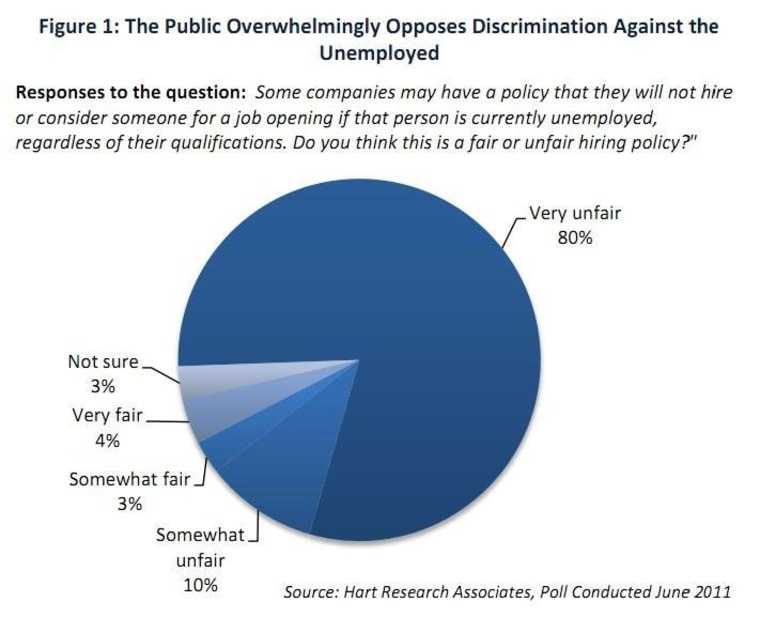On last night's show, Rachel made the point that the recent high rate of unemployment has a lot to do with the unemployed staying unemployed for longer. In other words, "high employment is due to persistent unemployment."
The reason? There are likely many, but one noteworthy problem takes place in a very specific setting - the hiring process between employer and potential employees. Catherine Rampell of The New York Times recently reported on a study of job postings on numerous employment websites, and discovered "hundreds that said employers would consider (or at least 'strongly prefer') only people currently employed or just recently laid off."
This blatantly excludes anyone who belongs in the "Continuing Joblessness" category below.

The stigma attached to being unemployed has increasingly become more of a factor in the hiring process, although the legality of discriminating against employment status remains in question. Rampell writes:
Legal experts say that the practice probably does not violate discrimination laws because unemployment is not a protected status, like age or race. The Equal Employment Opportunity Commission recently held a hearing, though, on whether discriminating against the jobless might be illegal because it disproportionately hurts older people and blacks. ...Given that the average duration of unemployment today is nine months — a record high — limiting a search to the “recently employed,” much less the currently employed, disqualifies millions.
The rationale also doesn't make much sense. As Rampell notes, "...people who have been out of work for two years or longer are people who were laid off during the recession. That means many of them were workers whose jobs were eliminated simply because their businesses were doing badly, not because they were personally incompetent." Basically, questioning a person's qualifications because they're out of a job could cause employers to miss a potentially great hire. Employer - 0, Applicant - 0.

The public also doesn't seem to like the idea very much - especially at a time when everyone's feeling the heat from the poor economy. The advocacy group National Employment Law Project released a study last month on public opinion of companies who will not consider or hire someone for a job opening simply for being unemployed, regardless of their background. An overwhelming amount of responders called it "Very Unfair".
There is some hope: this past March, New Jersey became the first state to make it illegal to post job postings that require applicants to be currently employed. At the federal level, both the House and the Senate within the past month have introduced legislation that also deals with the issue - in the House, the Fair Employment Act of 2011 would amend the Civil Rights Act to prohibit employers from refusing job applicants solely on the basis of unemployment.
Such a law would probably help dispel the use of job postings like this, but unfortunately, like any other anti-discrimination law, the validity of any cases brought forth would likely be difficult to prove. Employers would have to realize that the practice is inefficient for them in order to cause any considerable change.
